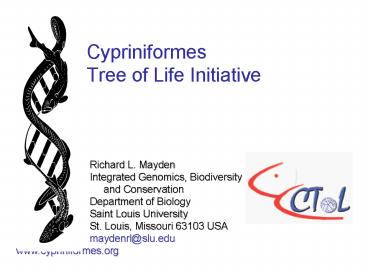Cypriniformes Tree of Life Initiative - PowerPoint PPT Presentation
1 / 25
Title:
Cypriniformes Tree of Life Initiative
Description:
Order Cypriniformes is a major group of Actiniopterygian fishes ... Large carp have been maintained in complex polyculture systems for thousands of years ... – PowerPoint PPT presentation
Number of Views:73
Avg rating:3.0/5.0
Title: Cypriniformes Tree of Life Initiative
1
Cypriniformes Tree of Life Initiative
Richard L. Mayden Integrated Genomics,
Biodiversity and Conservation
Department of Biology Saint Louis
University St. Louis, Missouri 63103 USA
maydenrl_at_slu.edu
www.cypriniformes.org
2
Maydens research and laboratory
- Integrated Genomics, Biodiversity, and
Conservation - Species discovery, inventory, descriptions
- Data integration, archiving, concatenation
- Phylogeny reconstruction
- Species concepts and ID methods
- DNA and vouchered specimens for nearly all North
American freshwater species ( 1100 sp.) - Frozen and EtOH
- Photovouchers
- multiple populations and individuals
3
- Order Cypriniformes is a major group of
Actiniopterygian fishes - Largest clade of freshwater fishes in the world
expected 5000 species - Cypriniformes are of great importance in
comparative biological studies, aquaculture, and
the pet trade. - Studies on the zebra fish (Danio rerio) are key
to understanding the molecular interactions of
development and developmental evolution - Large carp have been maintained in complex
polyculture systems for thousands of years - Important model organisms in evolution, molecular
evolution, biogeography speciation, comparative
ecology, etc.
4
(No Transcript)
5
Issues
- Despite their tremendous importance in human
culture, their diversity, model organisms, and
importance in ecosystem and evolutionary studies
- - basic phylogenetic relationships and diversity
of major clades poorly known, - classifications are problematic,
- many undescribed and cryptic species,
- several areas of planet are poorly inventoried.
6
CToL Project Success
- Tree of Life Projects are Unique
- Globally distributed clades
- Participants must think differently and work
together as as community - like superorganism - CToL will be a model project for new way
ofdoing large-scale systematics around World - Participants developed charter for
collaborative work and sharing specimens,
data, authorship, and ideas to achieve our
overall goals of project
7
Phylogenetic Objectives
Estimated 3,500 described species
8
Levels of Collaboration
9
Core Participants Global Geographic Coverage
Great Availability of Taxa
- USA Etheopia South Africa Turkmenistan
- Richard Mayden Abebe Getahun Paul Skelton
Vlaidmir Salnikov - Robert Wood
- Nevin Aspinwall Japan
- Phillip Harris Misaki Miya
- Paula Mabee Kenji Saitoh
- Miles Coburn Mutsumi Nishida
- Andrew Simons
- Hank Bart Mexico
- Nelson Rios Hector Espinosa
- Gloria Arratia Paco Garcia de Leon
- China Poland
- Huanzhang Liu Jolanta Szlachciak
- Meemann Chang
- Shunping He Russia
- Jun-Xing Yang Nina Bogutskaya
- Alexander Golubtsov
- Alexander Naseka
Associate and Adjunct Participants not listed
10
Shared Collaboration -- In concert with
Individual Laboratories Working Independently!
All work together for accomplishing the
1,000 species PHYLOGENY and species
diversity by collaboratories!
AND EACH laboratory can work
separate OR together on othertargeted groups
or taxonomic issues
USA
China
Europe
Russia
Africa
11
DNA Identification - A Process
12
DNA Barcoding
- GH
- Rd
- Rag1
- Rag2
- S7
NuclearGenes
Cyt-B12S16S ND4-5 ND2 CR
MitochondrialGenes
13
Web Portal
- Provides an interface for users to query and add
data to the back-end databases - Provides information on resources (tissues,
specimens etc.) available to researchers - Promotes community interaction through shared
workspaces - File repository of various information
- Email/discussion and archives
- Selected content made available to
education/outreach activities
14
Online Collaborative Environment for Taxonomic
Research
CTOL Members
Database SQL 2000
Web Portal IIS, Win 2003
Outreach Service
General Public
15
Data Objects
- Sequences (ATGCCCTACAGGATC)
- Images (Specimens/Anatomical Parts)
- Trees
- Nexus Files
16
Interactive File Management
17
Data Entry
18
Data Query
19
Query Results
20
Query Results Detail
21
Query Results Detail
22
Study Dependent on SharingData, Results, Ideas,
Materials
23
Study Dependent on SharingData, Results, Ideas,
Materials
24
Welcome to CToL
- The CToL welcomes collaborators to the project
- Collaborators can contribute in many ways
- Data generation - Taxon
Sampling - Morphological characters - Molecular
characters - Web resources - Species
sampling - Collaborators are authors or credited for their
contributions - We have limited money to distribute but seek
proposals - Annual meetings at ASIH
- Finally, hopefully we can help you obtain support
for this international effort from different
science agencies of countries, other agencies,
foundations, etc.! - Congratulations to Japanese collaborators for
funded Cypriniformes research following NSF Tree
of Life































